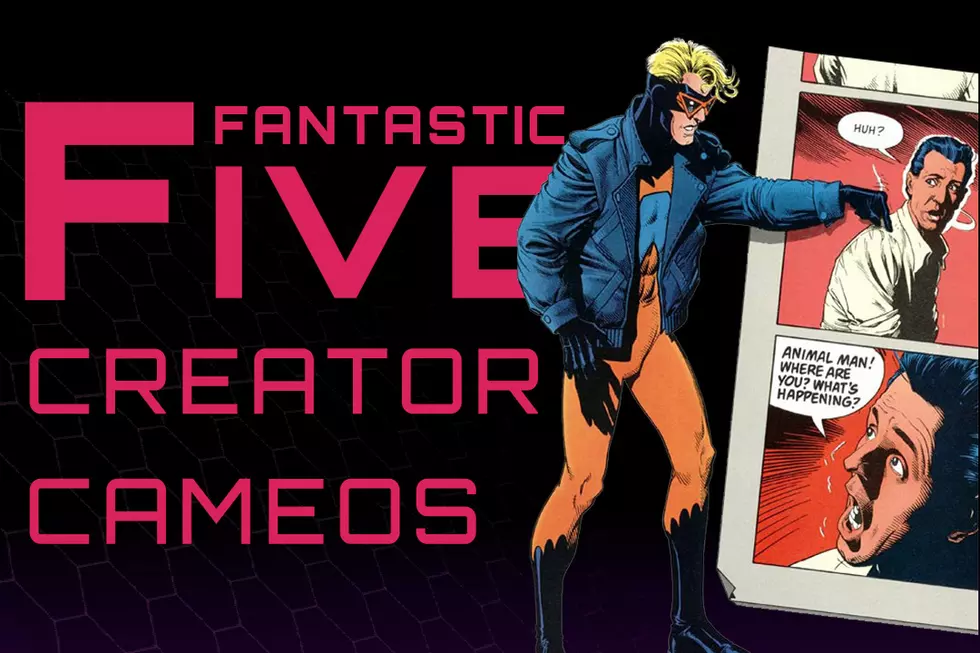
Buy This Book: ‘Elseworlds 80-Page Giant’ Gets A Digital Release

One of the great things about the rise of digital comics is how much potential there is for access to a company's back catalog. With a lower cost that comes from not actually printing and shipping books, it's a lot easier for a company to provide readers with older comics, from classics to books that never really got their chance to shine.
This week, DC offered up a perfect example of the latter with the digital release of 1999's Elseworlds 80-Page Giant, a book that was originally pulped at the last minute and spent the last 13 years as a bizarre "collector's item." And seriously? If you haven't already, this is a comic you need to get. For those of you who aren't already familiar with how things went down the first time, the Elseworlds 80-Page Giant was originally slated for release in August of 1999 as the product of editors Dan Raspler and Tony Bedard. At the time, DC was publishing a lot of quirky, off-beat super-hero books like Tom Peyer and Rags Morales's Hourman and Dan Curtis Johnson and J.H. Williams III's Chase. The Elseworlds Giant feels in a lot of ways like the culmination of that strange little late '90s era: Peyer and Johnson are featured prominently along with '90s mainstay Chuck Dixon, creating an entire massive book full of nothing but weird, often hilarious stories goofing on DC's characters, who even then were moving into a time where every single thing had to be Super Serious, You Guys. Looking back, it's difficult not to see the Elsweorlds Giant as one of the last comics before DC decided to pretty much eliminate fun as an editorial policy.
For those of you who aren't already familiar with how things went down the first time, the Elseworlds 80-Page Giant was originally slated for release in August of 1999 as the product of editors Dan Raspler and Tony Bedard. At the time, DC was publishing a lot of quirky, off-beat super-hero books like Tom Peyer and Rags Morales's Hourman and Dan Curtis Johnson and J.H. Williams III's Chase. The Elseworlds Giant feels in a lot of ways like the culmination of that strange little late '90s era: Peyer and Johnson are featured prominently along with '90s mainstay Chuck Dixon, creating an entire massive book full of nothing but weird, often hilarious stories goofing on DC's characters, who even then were moving into a time where every single thing had to be Super Serious, You Guys. Looking back, it's difficult not to see the Elsweorlds Giant as one of the last comics before DC decided to pretty much eliminate fun as an editorial policy.
Unfortunately, and maybe even fittingly, the Elseworlds Giant never really made it. At the last minute -- so last minute that a few hundred copies had already been shipped out to stores overseas -- then-president Paul Levitz decided to pulp the entire print run and shelve the project.
The source of the trouble, despite speculation that it might be down to a one-page strip in which the Batman of the Book of Genesis (better known to theologians as Adam) protected Eve from a Joker-headed Serpent while wearing only a cape and cowl, turned out to be a ten-page story by the legendary Kyle Baker and Elizabeth Glass called Letetia Lerner, Superman's Babysitter. Looking back from a time when DC's co-publisher lists a book like Identity Crisis as one of his ten proudest achievements, it's pretty hard to understand just what's so objectionable about a comic where a teenage girl is unwittingly tasked with watching over a super-powered indestructible baby that climbed into a microwave. I mean, really, that's a gag that showed up five years later in the Incredibles, a movie for six year-olds.
Personally, I think it might have a little more to do with the part of the story where Jonathan and Martha Kent are hiring a babysitter so they can drive to a motel and have sex without being interrupted by a baby with heat vision.

Either way, it's a fantastic bit of story that stands as one of Baker's best, and its destruction prompted a pretty huge critical backlash that was actually skewed towards the positive. Despite never officially being released, Letetia Lerner ended up winning the Eisner Award for Best Short Story, and Baker took home the Best Writer/Artist: Humor award as well.
DC eventually published the story a few years later in a pricey hardcover called Bizarro Comics, which followed a similar formula to the Elseworlds Giant by recruiting indie comics creators to do weird takes on DC properties. The whole thing was essentially created as a vehicle to finally get Letitia Lerner in print, and although it was even successful enough to warrant a second hardcover, the rest of the Elseworlds 80-Page Giant remained on the shelf. It wasn't until just last December that the whole thing was finally published as as a hundred-page giant with the addition of a Paul Pope Batman story from 1998.
With the digital release, though, it's finally legally available to a pretty huge audience, and it's well worth checking out. Letetia Lerner has had so much (fully deserved) praise heaped on it over the last decade that it barely even needs to be mentioned as a great story, but it really is. And it's not the only one.
Bronwyn Carlton, Greg Luzniak and Anibal Rodriguez's "Rockumentary," is worth it just for the panels in which the Martian Manhunter is redesigned as the David Bowie-esque "Slim Green Lord" and the appearance of Doomsday as the chatty lead singer of a metal band...

...but I'm honestly shocked that the mention of "alternative life-style" folk band Ivy and Harley hasn't been posted on literally every single website hosted by Tumblr.
There's also Peyer and Ariel Olivetti's "Dark Knight of the Golden Kingdom," a hilariously overwrought parody of Kingdom Come that's almost impossible to distinguish from the utterly sincere Kingdom Come imitators that have come out since:

The only thing that really sets it apart is that no lesser creator could ever have matched the Mash-Up Justice League and their adversary, Team-Face.

Also, as mentioned above, the Elseworlds Giant is the source of Mark Waid, Peyer and Ty Templeton's incredible "Silver Age Elseworlds," which inspired ComicsAlliance's own Great Comics That Never Happened series:

The real gem of the comic, for me at least, was Bob Haney and Kieron Dwyer's "Superman Jr. Is No More," one of the last stories Bob Haney wrote before his death in 2004. Haney was known for being one of the greatest architects of sheer kookiness in the Silver and Bronze Ages in books like Metamorpho and Brave and the Bold, but this one was a throwback to one of his most bizarre creations, the Super-Sons.
The Super-Sons were, as you might expect, the children of Batman and Superman, who looked exactly like their fathers -- they may have taken after their moms, too, but since Mrs. Superman and Batman only ever showed up as shadowy, unidentified figures, we'll never know -- and were even named Bruce Wayne Jr. and Clark Kent Jr. They were basically the same characters, just younger, as evidenced by the fact that they would occasionally refer to each other as stuff like "Bat-Dude."

In the pages of World's Finest, Haney pit them against strange challenges like a town run entirely by -- gasp! -- women, and the series was so weird that even in the Bronze Age, it was retconned away as a computer simulation designed by Superman to see how weird things could get. This particular story was previously published when DC did a collection of Haney's "Saga of the Super-Sons," but if you don't already have that, it's well worth it just to get a taste of how weird and great his work could be.
The entire book is like that: A great showcase of underrated talent, doing stories in a way that you very rarely get to see in today's comics. Having it available digitally, where you can buy it any time you want without ever needing to worry about availability or selling out, is a great example of the opportunities of digital comics, and it makes this one downright essential.
More From ComicsAlliance




![The Blossom Twins And Pete Woods Wreak Havoc On Riverdale In ‘Archie’ #18 [Interview]](http://townsquare.media/site/622/files/2017/03/Archie00.jpg?w=980&q=75)



![At Last, It’s Dilton’s Turn To Shine In ‘Archie’ #16 [Preview]](http://townsquare.media/site/622/files/2017/01/Archie00.jpg?w=980&q=75)
